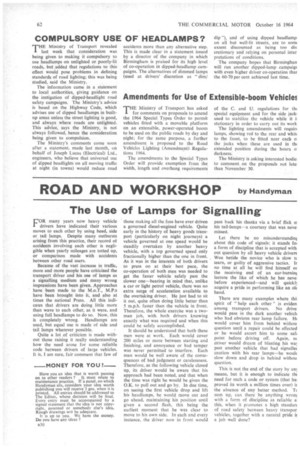COMPULSORY USE OF HEADLAMPS?
Page 64

If you've noticed an error in this article please click here to report it so we can fix it.
TE Ministry of Transport revealed 1 last week that consideration was being given to making it compulsory to use headlamps on unlighted or poorly-lit roads, but _added that regulations to this effect would pose problems in defining standards of road lighting; this was being studied, said the Ministry.
The information came in a statement to local authorities, giving guidance on the instigation of dipped-headlight road safety campaigns, The Ministry's advice is based on the Highway Code, which advises use of dipped headlamps in builtup areas unless the street lighting is good, and always where roads are unlighted. This advice, says the Ministry, is not always followed, hence the consideration being given to compulsion.
The Ministry's comments come soon after a statement, made last month, on behalf of Joseph Lucas (Electrical) Ltd,, engineers, who believe that universal use of dipped headlights 'on all moving traffic at night (in towns) would reduce road accidents more than any alternative step. This is made clear in a statement issued by a director of. the company in which Birmingham is praised for its high level of co-operation in dipped-headlamp campaigns. The alternatives of dimmed lamps (used at drivers' discretion as "dim/ dip "), and of using dipped headlamp on all but well-lit streets, are to sotm extent discounted as being too dig cretionary and relying on personal inter pretations of conditions.
The company hopes that Birminghan will run another dipped-lamp campaigi with even higher driver co-operation that the 60-70 per cent achieved last time.




































































































































